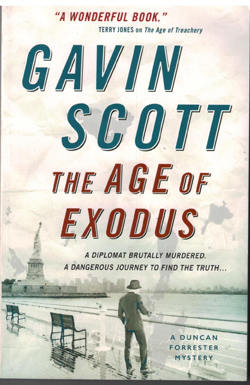The Age of Exodus by Gavin Scott; Titan Books © 2018; ISBN 9781783-297849; 399 pages, $14.95
By Donald H. Harrison

 SAN DIEGO –The “Exodus” in this mystery novel is not the meandering one in which Moses led his fellow Hebrews through the Sinai, but rather a reference to the ship that stirred the conscience of the world in behalf of the remnants of European Jewry seeking to establish a Jewish homeland in Palestine.
SAN DIEGO –The “Exodus” in this mystery novel is not the meandering one in which Moses led his fellow Hebrews through the Sinai, but rather a reference to the ship that stirred the conscience of the world in behalf of the remnants of European Jewry seeking to establish a Jewish homeland in Palestine.
During World War II, Duncan Forrester on behalf of the British government taught members of the Haganah in Palestine the art of warfare; he being a notable expert in self-defense and the use of weapons. When the war was over, he returned to his job at Oxford University as a distinguished scholar of ancient civilizations. However, appeals to his wartime and peacetime expertise soon drew him from the academic cloisters into the dangerous real world.
Initially, he was asked to intercede in the case of a British diplomat who had come into possession of a Sumerian seal. His receipt of the seal had been followed by death threats, and the diplomat, scared out of his wits, hoped that Forrester could help him figure out what was written in cuneiform on the seal, and, more importantly, why anyone would want to kill him. By the next chapter of the book, the man was indeed murdered, and Forrester was determined to find out why and by whom.
However, another request for his help took immediate precedence. Ernest Bevin, the British Foreign Minister, would be traveling to New York, to the temporary headquarters of the United Nations, and feared that his hard stand against Jewish immigration to Palestine might make him the target of members of the Irgun or the Stern Gang, two groups that were engaged in guerrilla warfare against the British mandatory power. Figuring that Forrester’s experience with the Haganah might enable him to recognize any potential assassins, Bevin recruited Forrester to be a secret part of his protection detail.
Forrester crossed the Atlantic on the Queen Mary, far enough from Bevin’s official detail not to be confused with them, and close enough to keep an eye on matters. En route to New York, he was attacked by a golem-like figure, who kept his face covered, and nearly was thrown off the great Cunard liner by the assailant who got away. Thereafter, Forrester’s life seemed to be in danger wherever he went—but it was unclear who his enemies were and which of his two assignments had provoked them. Could it be there was linkage between murderers who believed in the occult powers of an ancient Sumerian god, and those who would assassinate England’s working-man foreign minister, whose pro-Arab policies were occasioning Britain’s stiffening, inhumane, policies against Jews seeking to build a homeland in Palestine?
As an academic detective and a self-defense expert, Forrester is at home in radically different environments. He stalks suspects in upper class drawing rooms, and fights them on dark piers. Seemingly a man for all seasons, Forrester has appeared in two previous mysteries by Scott: The Age of Treachery and The Age of Olympus, and despite the many attempts on his life, Forrester seems to be aging very well.
If I have a quibble with the author, it is that he introduces too many extraneous characters into the plot. Yes, some are needed to throw Forrester—and us readers—off the scent, but with too many characters, each dropping little hints, but none revealing the full extent of the mystery, keeping track of who’s who can become quite daunting. At one point, I thought I might have to start filling out index cards about each character, just to keep them straight.
If you are an armchair traveler, you will enjoy author Scott’s brief but evocative descriptions of the various places in London, New York, Geneva, and aboard the Queen Mary that Forrester visits. Those who remember Abba Eban will be fascinated by Scott’s description of the urbane, future Israeli Foreign Minister working in behalf of his fellow Jews during the lead-up to the 1947 Partition vote by the United Nations General Assembly.
*
Harrison is editor of San Diego Jewish World. He may be contacted via donald.harrison@sdjewishworld.com